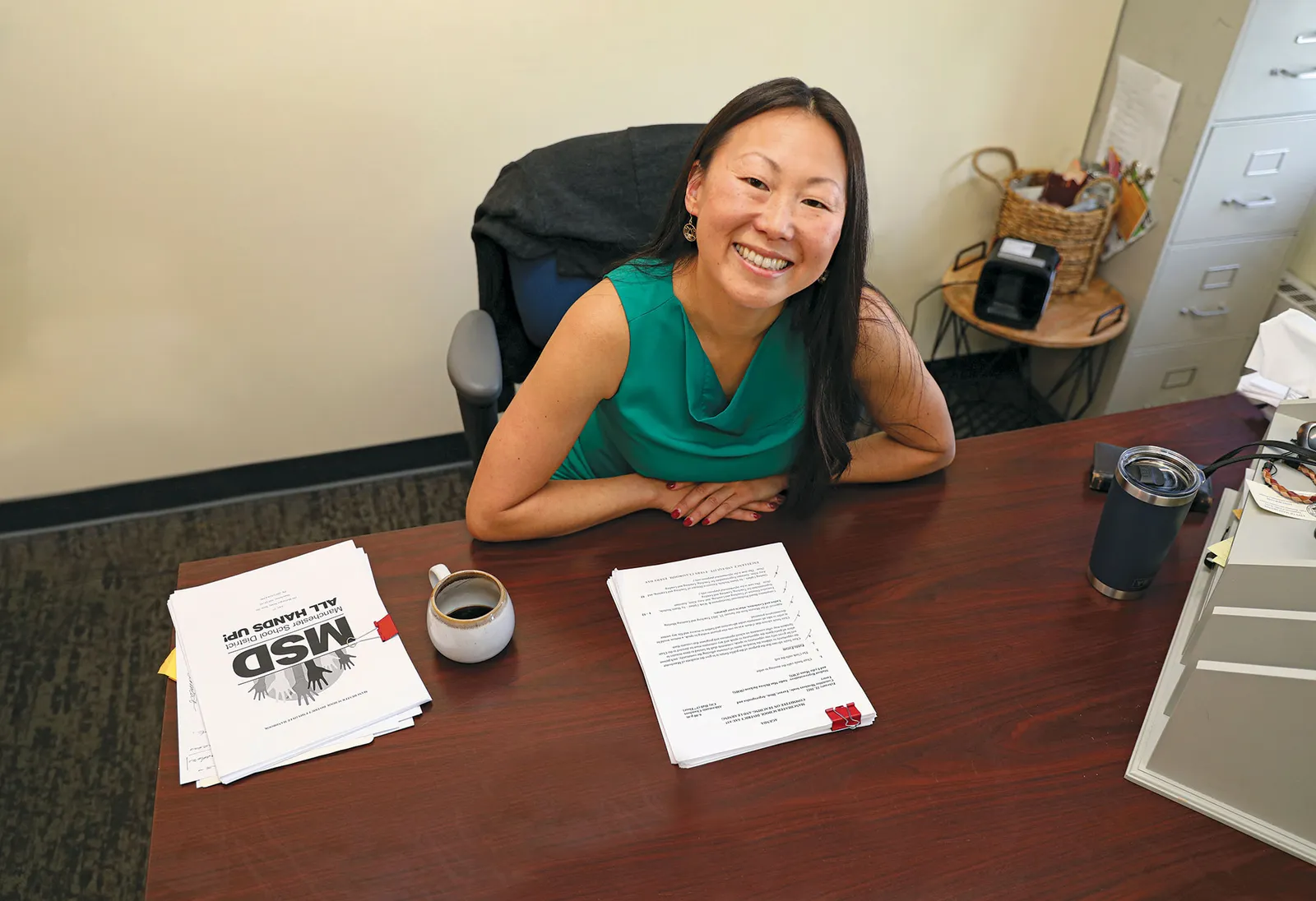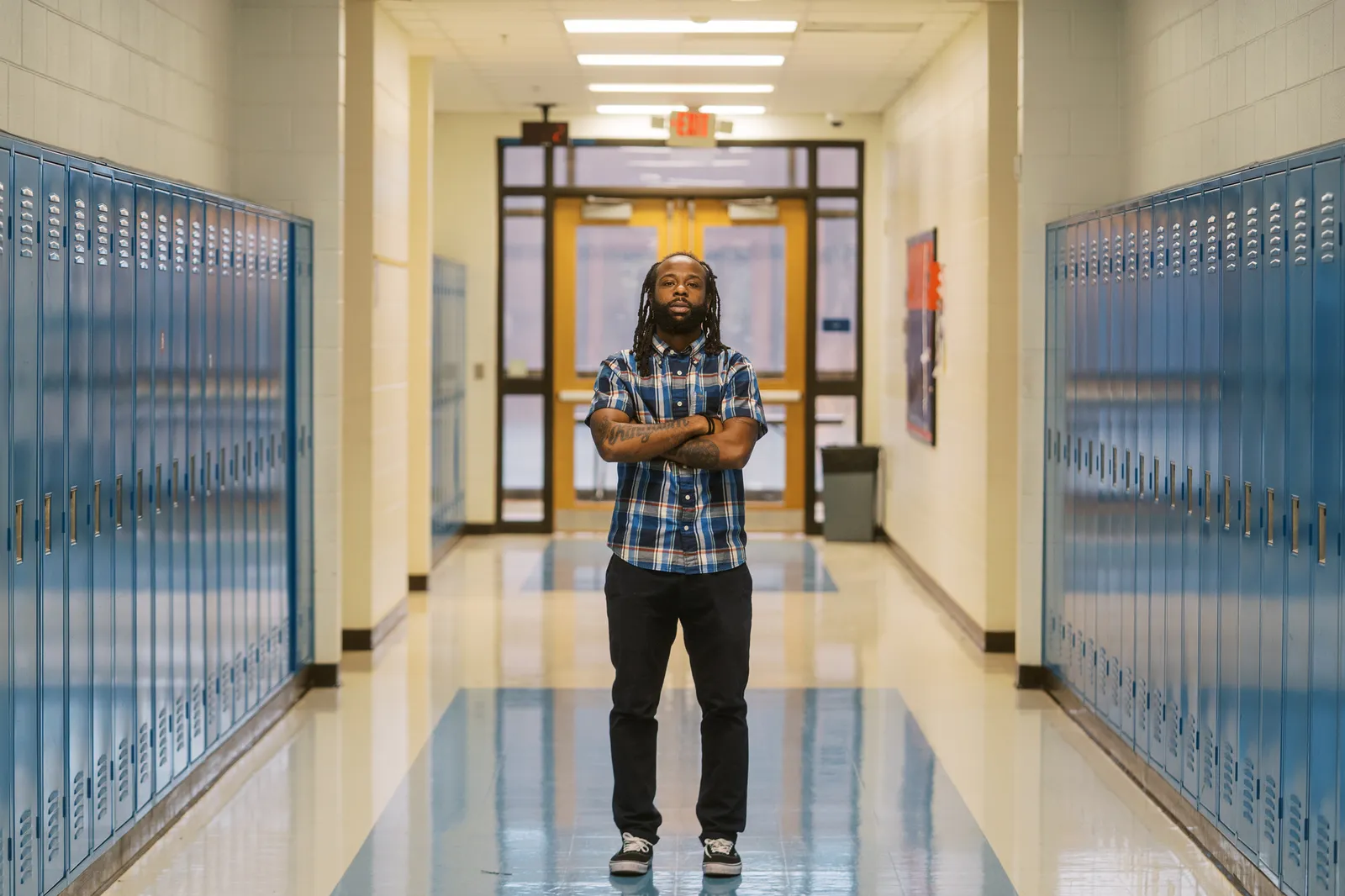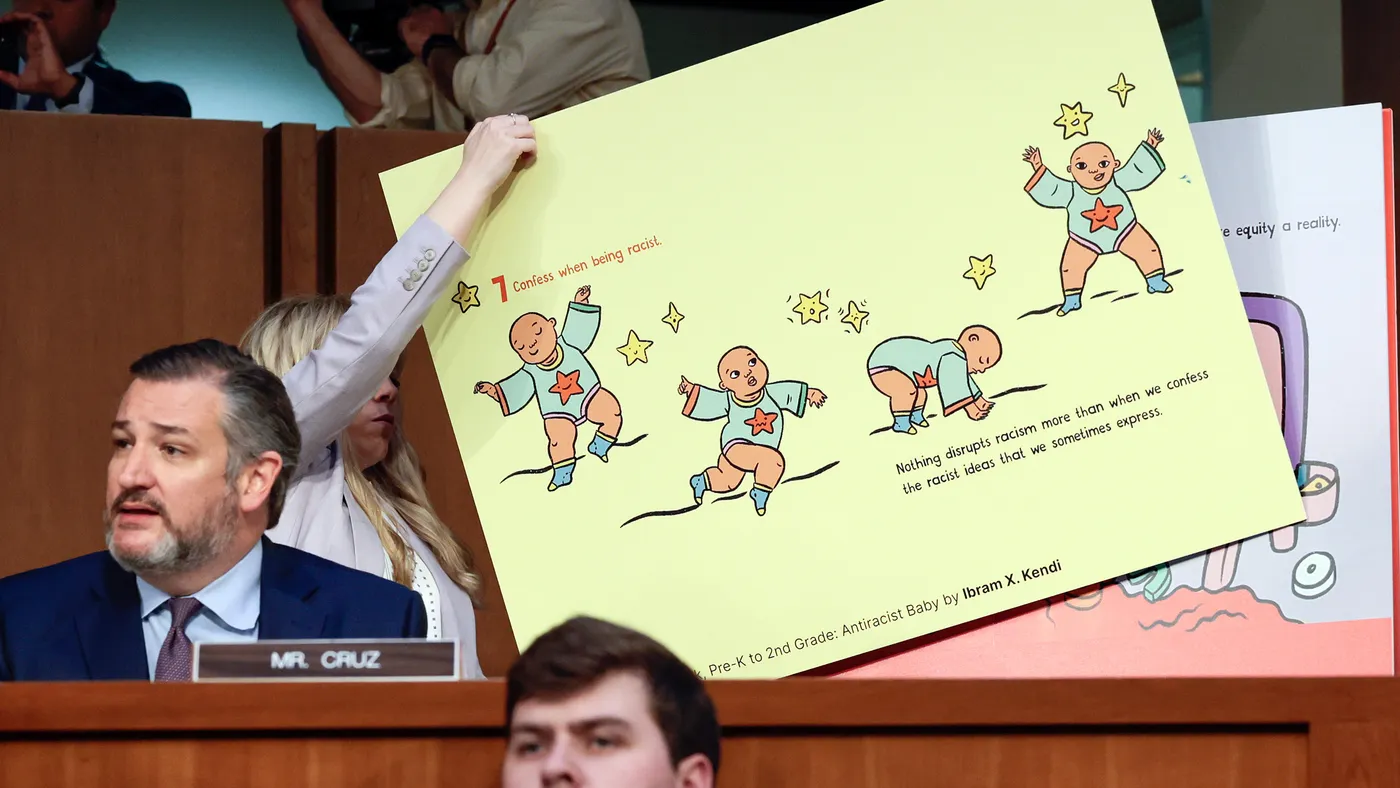This article is the second installment of Star-Spangled Bans, a series examining the history and ongoing impacts of policies seeking to censor classroom discussions. For the full series, click here.
In West Virginia's Roane County Schools, finding a Black teacher is like scaling one of the many mountains in the town: a steep uphill climb. The 484-square-mile rural county of less than 15,000 is 97% White with a Black population so low it's marked 0% by federal counts. A history of slavery and racism is even embedded in the town's name: Spencer Roane was an 1800s slaveowner and judge who opposed abolition.
So when Ugo Naomi Onwuka, a biracial Nigerian American, returned to the county she grew up in to teach as a substitute, she was an outlier. But under her belt was a fresh bachelor's degree in child and family studies with a concentration in child development. She felt prepared to take on her first public school job.
By only the second day in the classroom, Onwuka's elementary-grade students were curious about her hair.
"They were like, 'Wow, I've never seen that before," Onwuka posted in a TikTok video that went viral. "So we talked about what Black hair is, how I did my hair like this, and I showed them a picture of me in my Afro."
With her permission, some of her students combed their hands through her hair. Children are hands-on learners, after all, she thought.
Not soon after, however, she felt a shift among her colleagues. She heard whispers and felt like she was being treated differently. She stopped receiving substitute assignments.
Then, about a month after her start date and without warning, Onwuka no longer worked for the district.
@ugoonwuka2 i'm doing my best guys ???????? #fyp #foryou #viral #teaching #teachersoftiktok #blackteacher #blackeducator ♬ original sound - Ugo Onwuka
Anti-CRT policies balloon
Unlike many other red states, West Virginia — despite an attempt to pass an anti-critical race theory bill — does not have a law on the books limiting teachers from discussing race and gender topics in the classroom.
In March, the state Senate advanced a bill to prohibit schools from teaching that "an individual, by virtue of the individual’s race, ethnicity, or biological sex, is inherently racist, sexist, or oppressive, whether consciously or unconsciously," among other things. Despite passing both the House and Senate, the bill failed to become law after the legislature missed the final vote deadline before the session ended.
The state is one of some 36 where similar policies or statements have been introduced or adopted since then-President Donald Trump introduced such language through executive orders in 2020, according to the UCLA School of Law Critical Race Studies Program's CRT Forward Tracking Project. Since then, at least 28 states have adopted policies or statements that educators say limit discussions around race and gender, create a culture of fear, and prevent marginalized students and their peers from learning about their histories and identities.
In 2020 and 2021, some 894 school districts representing 35% of all K-12 students dealt with local actions related to anti-CRT campaigns in classrooms, according to researchers from the University of California, Los Angeles and the University of California, San Diego.
Some teachers now avoid books like Toni Morrison's “The Bluest Eye” and Maya Angelou's “I Know Why the Caged Bird Sings" — long seen as classic pieces of literature but now banned in various parts of the country.
Educators reported incidents of teachers being unsure of whether or how to discipline use of the n-word and having to notify parents before students watch Martin Luther King's “I Have a Dream" speech. These teachers say they feel harassed and targeted, and they are afraid to speak with their colleagues about race or gender-related issues.
Even in states where laws haven't been passed, educators say national rhetoric has mobilized local groups of parents who are hypervigilant about what's taught in the classroom. On one hand, parents are pushing for their own rights to control what their children learn, and on the other hand, teachers, counselors and sometimes administrators say their profession and experience are being questioned.
Moms for Liberty co-founder Tiffany Justice, who supports anti-CRT efforts, said teachers should not be allowed to discuss social justice issues and worldviews. "There shouldn't be a worldview taught in the classroom that is outside and antithetical to the teaching in the home," Justice said.
"Teachers are government actors — they're government employees — and they do not have the right to free speech," Justice said. "They're employees, and they are told what to do. And their job is to do what they're told."
When asked about whether parents should similarly have their rights respected to control what's taught in school when they feel that social justice issues such as Black Lives Matter or LGBTQ rights can't be separated from their children's identities, Justice did not directly answer the question.

In the 1990s, as Tina Philibotte was growing up in Manchester, New Hampshire, she was the only Korean American student. Even today, according to 2020 Census data, just 6% of the Granite State’s population is Asian.
"And what I heard constantly growing up is, ‘We don't see you as one of those people — we see you just like us,’" remembers Philibotte, who is now a chief equity officer for Manchester School District. "You're one of the good ones."
Philibotte and her few friends of color found themselves "code-switching," or altering their speech and behavior to fit in a White-majority setting — "because we needed to protect ourselves and get through the day," she said. "We have to actually reckon with the fact that people just don't want to see us and don't want to acknowledge our full existence."
Nearly three decades later, Philibotte is still grappling with this situation. "On most days in this job, I've walked into a room and I am the only person of color," Philibotte said. And now, thanks to New Hampshire's divisive concepts law, she finds herself thinking twice before discussing race-related issues at all.
As someone who offers statewide diversity, equity and inclusion training, she's had to swap out the word "bias" with "socialization" in the training she provides.
"It's a reminder of how I just don't belong," Philibotte said. "We have to change all of our words to suit the needs of this law." New Hampshire's statute prohibits training and education that, among other things, teaches that an individual is consciously or unconsciously inherently racist, sexist or oppressive as a result of their racial, sexual, gender, or other identities.
Unlike Philibotte, Deborah Gist, superintendent of Tulsa Public Schools, did not change her district's anti-bias training for teachers after Oklahoma's anti-CRT law passed. "We're confident that there isn't anything that we are doing that is inconsistent" with the law, Gist said.
Still, in February, a teacher filed a complaint with the state board of education alleging the district had violated the law, HB 1775. The complaint said mandatory training the teacher was "forced to watch" included statements "that specifically shame white people for past offenses in history, and state that all are implicitly racially biased by nature."
The training, which was reviewed by K-12 Dive, did not include statements shaming White people for historical events, or statements alleging only White people are implicitly biased.
Rather, it explained the concept of implicit bias and how it exists in the subconscious whether you actually hold those beliefs or not. It also cited facts on the shifting racial composition of U.S. public school enrollment, statistics on disproportionate discipline rates for Black students and students with disabilities, and research on implicit and explicit bias. Furthermore, it described cultural competence and urged teachers to make all students from all backgrounds feel welcome.
Where White people are specifically mentioned in the training, it is to acknowledge changing racial demographics in school enrollment and that cultural institutions designed around a predominantly White middle class society were shifting to adapt to a more culturally diverse society.
"Implicit racial biases may not be part of who you believe yourself to be, but they're still there," said the instructor in the training. "Implicit biases generally lead people to favor those in their own racial group and hold biases against those who aren't. Still, research has shown that people can hold implicit racial biases about their own racial group."
The Oklahoma State Department of Education, which reviewed nearly identical audio and video trainings, first found the audio — but not the video — violated the law. As a result, however, the department recommended to the Oklahoma State Board of Education that Tulsa Public Schools, the state's largest district, be downgraded to "accredited with deficiency."
The board went even a step further than the department's recommendation, warning the district it could lose its accreditation entirely.
Following the board's decision, the department clarified in a comment to Fox 25 that both the audio and video "violated the spirit of the law" but said the audio "had a greater impact on the agency's review team." The incident "underscores how the vague language of HB 1775 invites imprecise judgment calls, which in turn can have a chilling effect on classroom instruction," the department said.
Facing the risk of potential discreditation, Gist pulled the training altogether.

Decades after feeling unsafe as a Korean American student, Philibotte now sees her high school-aged daughter walking the same path as she routinely deals with racial harassment and slurs.
"This is the reality of our country's disparities," Philibotte's daughter told the New Hampshire House of Representatives during a 2021 hearing on the divisive concepts statute. Reminiscent of what she wanted during her own childhood, Philibotte said her daughter was seeking an environment where she felt safe and her experiences understood.
Safety is, however, the opposite of what resulted. Shortly after her testimony, Philibotte's daughter began receiving death threats. The student is not being named here out of fear for her well-being.
While state lawmakers lauded Philibotte's daughter for speaking up, they nonetheless passed the divisive concepts ban soon after. "And at the end of the day, nothing changed," Philibotte said.
It's students like Philibotte's daughter who are shortchanged the most when classroom censorship laws and book bans are put in place, say lawyers, free speech advocates and educators who oppose the measures.
"It affected the teachers, but the effect is really going to happen to the students," said Anthony Crawford, a 9th grade English teacher in Oklahoma City who is involved in a lawsuit against Oklahoma's anti-CRT law. "It's going to show within years from now."
Multiple educators report the laws negatively impacting their relationships with students.
"Unless we can establish that relationship where there's a sense of safety [and] security, the learning just doesn't happen," said Anton Schulzki, a social studies teacher in Colorado and former president of the National Council for the Social Studies. "Or it doesn't happen in a way that should make you feel safe."
The laws have had a disproportionate impact on educators and students of color, including Black and Native American students, some teachers said. Educators of color, Philibotte said, are more careful than their White colleagues with what they can and cannot broach in the classroom.
"It kind of puts you even more at risk," said Philibotte, "because I already have a target on my back."
Crawford laments the situation faced by his own Black daughter and his Black students, who he said would have been empowered by learning about their history and identities.
"As a father, this lets me know that, you know, the type of teaching I need to do at home with my daughter, to make sure that she understands who she is, as she grows up," Crawford said. "And know that the lessons that she learned at home will never be repeated in the school."

In the past year, multiple free speech lawsuits have cropped up around the nation challenging divisive concepts laws. At the forefront of this movement is the ACLU, which has filed separate lawsuits in New Hampshire, where Philibotte has joined in her individual capacity, and Oklahoma, where Crawford is involved.
Other lawsuits were filed in Florida, one of which led to a partial temporary injunction in August against Gov. Ron DeSantis' Stop the Wrongs to Our Kids and Employees Act, or Stop WOKE, by U.S. District Judge Mark Walker. The act limits how schools discuss race, gender and history in classrooms, building on the state board's previous efforts to do the same.
"Florida has seemed like a First Amendment upside down," Walker said in his decision. "Normally, the First Amendment bars the state from burdening speech, while private actors may burden speech freely. But in Florida, the First Amendment apparently bars private actors from burdening speech, while the state may burden speech freely."
Lawyers for the ACLU, which has challenged the higher education portion of the same law, said they are on the lookout for its impact on K-12 and are open to future litigation.
As lawsuits make their way through these jurisdictions, trends to censor classroom discussions are expected to take hold in states like West Virginia and Arizona where proposals narrowly failed earlier, said Jeremy Young, senior manager of free expression and education at PEN America.
Young said he expects lawmakers to add new penalties and punishments to existing restrictions on instruction. "There may also be a shift to other types of censorious legislation, such as 'curriculum transparency' bills that place undue administrative burdens on teachers and make it easier for activists to challenge classroom materials," he said.
the situation in roane county really left me a lot more messed up then people realize. I lost my job, my family, my home. I’m not in therapy bc I can’t afford it. i don’t have medical care bc I can’t afford it. im dealing with severe anxiety and depression as a result
— yugie (@UgoOnwuka) November 13, 2022
‘My only options were to either assimilate or leave’
And as lawmakers and policymakers and community members haggle over the laws and the implementation, teacher morale continues to tank.
Gist, whose school district's anti-bias trainings nearly cost the system its accreditation, said the fear-driven environment has made the jobs of already underpaid teachers even more difficult.
"There's no question that it plays a role in the ability to bring people on and for folks to stay," Gist said.
According to a RAND report released in August, nearly 1 in 4 educators surveyed earlier this year said their school or district leaders asked them to avoid teaching about social or political issues. They also reported harassment, primarily from students' family members, related to how race, racism and bias are taught in schools — something that can negatively shape teachers’ perceptions of their school’s climate, the RAND report said.
"We're seeing … these pockets where there's really high distrust and even downright disgust towards educators as being incapable of doing their jobs," said Megan Fromm, education manager for the National Association for Media Literacy Education.
Moms for Liberty's Justice, for her part, questions whether parents should trust educators. "And so my question back to the teachers and the curriculum experts and all the people is, why should we trust you to talk about anything else with our kids" other than what is in teaching standards?
"Why should we even allow you the time to talk about anything else with our children besides the curriculum set forth? When you can't even seem to do that very well," Justice said.
For Fromm, sentiments of mistrust are "wearing on educators."
This is borne out in the RAND report, which found 43% of teachers who reported harassment over policies about teaching race, racism or bias said their school did not foster “a sense of belonging for teachers of color."
Onwuka, the former substitute teacher for Roane County Schools, is considering legal action based on her alleged treatment as an educator of color. What happened is still open to debate: Onwuka claims she was pushed out of the district and fired, while the district alleges she resigned after concerns from community members surfaced but before they could address these concerns with Onwuka.
Roane County Schools Superintendent Richard Duncan did not respond to questions about the details of what led to Onwuka's departure from the district. However, he noted the district has generally had issues with staff "distributing inappropriate social media content using official email" and "creating social media content while obviously at school."
According to Onwuka, her racial identity and decision to engage with children on the subject was met with community pushback that eventually cost her her job. "They are saying I was pushing something on them when the reality is that this is my way of life," Onwuka said. "I am a confident Black woman living in a predominantly White space, and it angers them. My only options were to either assimilate or leave."
Expecting to be harassed had she stayed, Onwuka has ventured far from West Virginia — to teach in Costa Rica.
"The kids are the reason I stayed for so long," Onwuka said about teaching in the United States. "And while I learned a lot, I am not certain if I want to go back [there] to public schools or not.”








